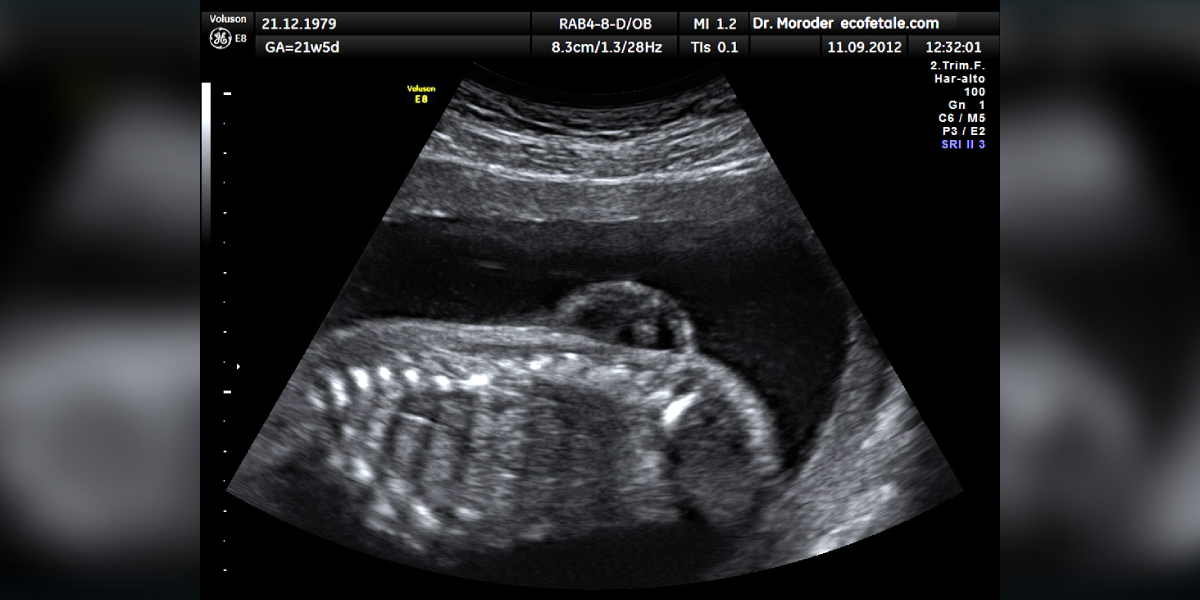Published Jul 10, 2023 | 12:00 PM ⚊ Updated Jul 10, 2023 | 12:00 PM

Myelomeningocele in ultrasonography. (Wikimedia Commons)
The Vijayapura District Consumer Disputes Redressal Commission in Karnataka has directed a radiologist to pay ₹20 lakh as compensation to a woman whose newborn baby was diagnosed with myelomeningocele, a congenital condition.
The doctor had failed to detect the foetal anomaly during ultrasound scanning conducted throughout the woman’s pregnancy.
Myelomeningocele is a type of neural tube defect (NTD) and a congenital condition that occurs when a baby’s backbone (spine) and spinal canal do not close properly before birth.
This birth defect typically develops within the first four weeks of pregnancy. Myelomeningocele is characterised by an incomplete closure of the neural tube (neural tube forms the early brain and spine), resulting in a fluid-filled sac that protrudes from the baby’s back.
Complications associated with myelomeningocele include:
Myelomeningocele can be diagnosed prenatally through tests like AFP (alpha-fetoprotein) and an ultrasound.
Elevated AFP levels indicate a higher chance of a defect in the spine and spinal cord. Ultrasound scans during the first and second trimesters provide accurate detection of myelomeningocele.
An anomaly scan assesses various foetal body parts to determine overall growth of the baby, focusing on the brain, spine, heart, stomach, bowel, kidneys, and limbs, as well as placental position and amniotic fluid levels. Its purpose is to identify rare conditions in these areas.
Non-invasive prenatal testing (NIPT) analyses cell-free DNA from the mother’s bloodstream, including placental cells, enabling early detection of specific genetic abnormalities, without harm to the foetus.
A Vijayapura resident, Pooja, sought regular maternity care from gynaecologist Dr Shailaja A Inamdar throughout her pregnancy in 2020.

An ultrasound can be used to detect congenital conditions like a myelomeningocele. (Wikimedia Commons)
During her 5th and 8th months of pregnancy, Dr Inamdar referred her to Dr Rajani P Jadhav, a radiologist, for foetal anomaly scans.
Following Dr Inamdar’s recommendation, Pooja visited Dr Jadhav’s scanning centre and underwent the necessary tests, including the foetal anomaly scan — a scan to detect abnormalities in the developing foetus.
Dr Jadhav provided reports indicating no signs of a meningomyelocele (another name for myelomeningocele) and Dr Inamdar concurred with this assessment, assuring Pooja of an easy delivery of a healthy baby.
However, Pooja’s complaint alleges that when she gave birth to her male child at Dr Inamdar’s nursing home, a “10×12 cm meningomyelocele” was discovered on the baby’s back, as informed by Dr Inamdar.
Consequently, the baby had to undergo surgery for the removal of the myelomeningocele at Sanjeevini Hospital in Vijayapura, resulting in significant financial expenses for Pooja and her family.
Furthermore, due to the presence of the myelomeningocele, the newborn baby experienced a lack of physical development, as well as a lack of control over urine and bowel movements.
Pooja also sought a second opinion from a paediatric surgeon, who provided a grim prognosis. According to the surgeon, the newborn child would endure lifelong challenges, including recurring urinary tract infections and potential kidney failure in the future.
The surgeon further noted that the child’s future reproductive activity could be affected by issues related to erection and ejaculation.
“…had consulted the opponents expecting a higher degree of skill and standard of care for the delivery of the healthy baby but the opponents had not exercised their reasonable degree of skill and care and hence there is a breach of duty by the opponents,” read Pooja’s complaint to the commission.
She further said that due to the negligence of the said doctors, her family and she were suffering physically, mentally, and financially.
Dr Inamdar argued in the commission that the detection of a myelomeningocele is not possible through clinical examination alone.
Therefore, she referred Pooja to Dr Jadhav for scanning evaluations to assess any anomalies, including a repeat scan before delivery. Both reports indicated normal findings, suggesting no negligence on her part.
Dr Jadhav, on the other hand, stated that the scan report cannot accurately predict future changes in the foetus, as it depends on the circumstances and stage of development.
During the proceedings, the Vijayapura District Consumer Disputes Redressal Commission noted that the radiologist had failed to record essential patient details such as age, sex, address, contact number, and date.
The commission carefully deliberated over the case and firmly held the radiologist responsible for negligence, emphasising that the swelling on the baby’s lower back should have been detected during the second-trimester scan.
The court stressed that early and accurate detection would have enabled the parents to make an informed decision within the legal timeframe.
The court further stated that the principle of res ipsa loquitur (meaning “the thing speaks for itself”) applied, whereby the “thing” (the negligence) speaks for itself, placing the burden of disproving the allegations on the radiologist.
“In such a case, it is for the opposite party to prove that she has taken care and done her duty, to repel the charge of negligence. No concrete or rebuttal evidence was put forth by the radiologist to disprove the allegations of the complainant,” stated the commission.
The commission absolved the gynaecologist of any negligence while ordering the radiologist to pay ₹15 lakh as compensation, along with ₹10,000 for litigation fees.
Furthermore, the radiologist was instructed to open a fixed deposit of ₹5 lakh under the child’s name until they reach 18 years of age.

